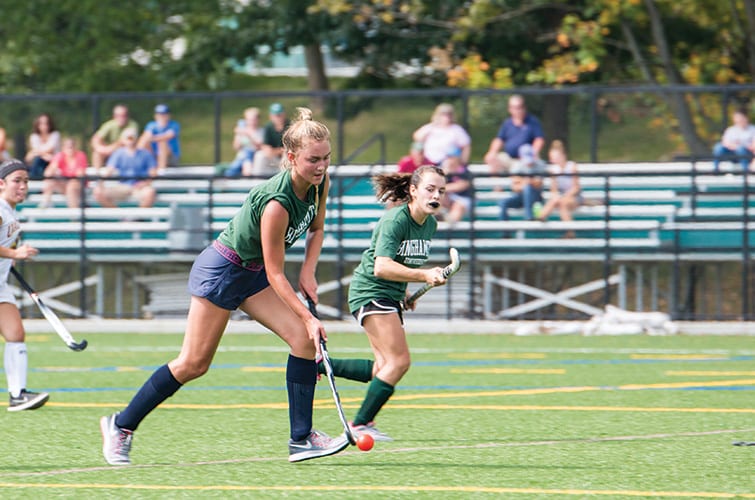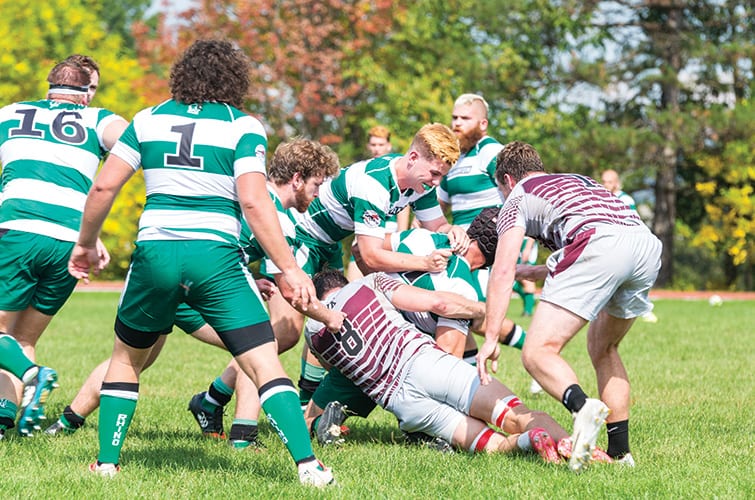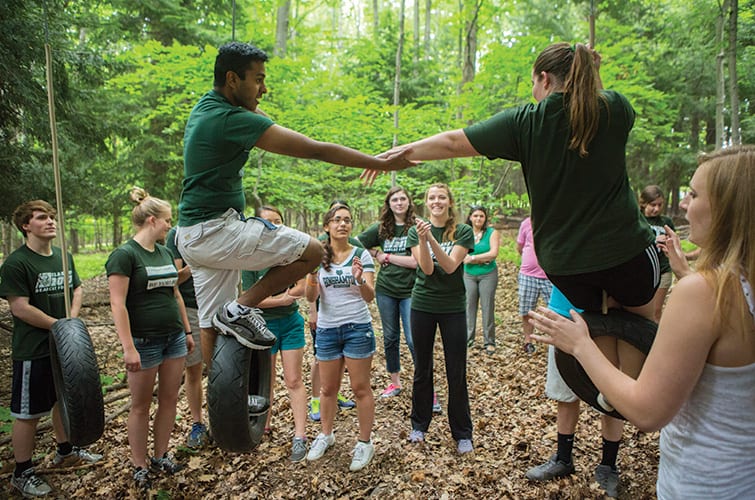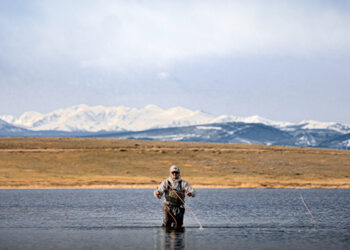Every year, Expresso hosts a Fall Frenzy, pitting schools to compete in a March-Madness-like tournament for miles achieved on the brand’s bikes.
The Binghamton University Campus Recreational Services team has participated the past several years, winning in 2017 and 2018. It has taken some serious dedication and friendly, light-hearted competition.
“We challenge each other and say, ‘OK, you’re going to ride the bike,’” shared Cindy Cowden, the senior associate director. “‘We’re going to have your meetings on the bike now because we need miles.’ We would spend lunch hours on the bikes. Then it would get into, ‘Well, how many miles did you do?’ The next thing you know we’ve got people who have been on the bike for hours at a time after work.”
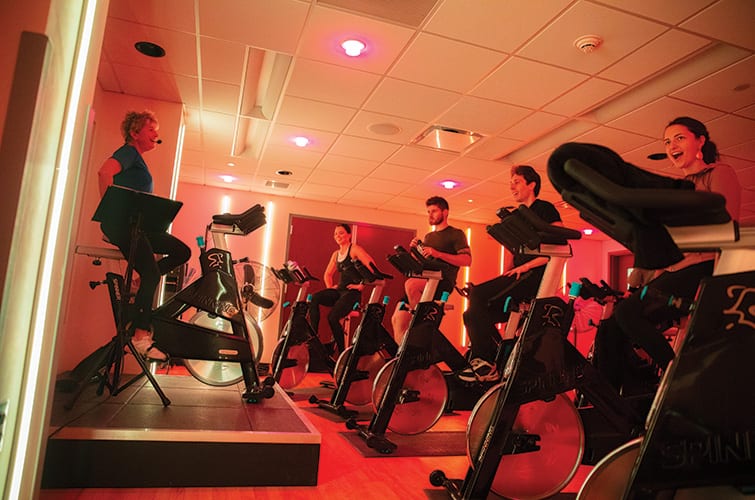
This spirit of competitiveness has been a driving force for Campus Rec. It motivates the team members to continuously improve programs, services and facilities. For example, the indoor space of the Rec Center at the East Gym has reached its max. Cowden shared the university would have to expand the building for them to be able to fit anything else inside.
So instead, the team took their spirit of continual improvement and applied it to the National Fitness Campaign’s grant program for outdoor fitness courts. The Fitness Court (FitCourt) is opening the beginning of August 2021.
A Deeper Look at the Binghamton FitCourt
“Although this project has been in development for nearly two years, the recent COVID-19 pandemic has prioritized the need for outdoor physical activity opportunities,” said Jenna Moore, the assistant director of Fitness and Wellness. “The outdoor FitCourt will be available to the campus community at no extra cost. This project makes physical activity more accessible for our university community, as it helps to minimize potential barriers to exercise.”
The FitCourt will also have an app that provides workouts for every fitness level, guiding students through an outdoor workout.
Campus Rec has also turned its attention to the 182-acre nature preserve on campus, the recreational turf field, the tennis courts, a Challenge Course and an 18-hole disc golf course. Plus, students have been eager for outdoor programming, like trips to the Adirondacks and Catskills Mountains. The outdoor spaces expand recreation’s footprint on and off campus.
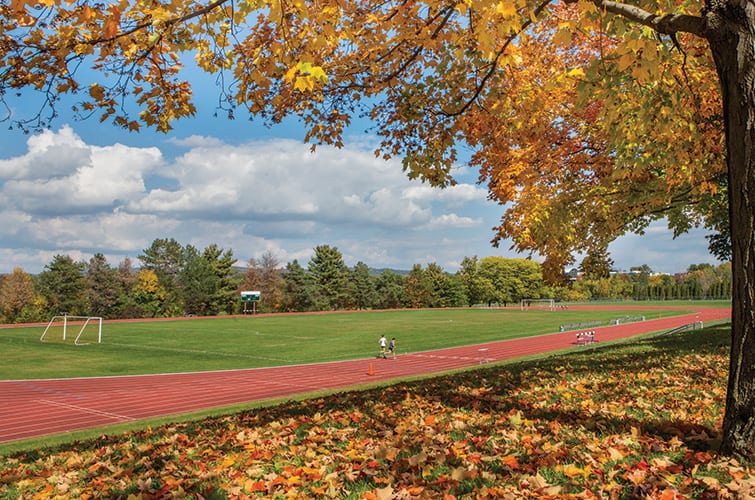
Although some have voiced concerns over Binghamton’s northeastern location paired with outdoor activities, Cowden said they are finding students a bit more robust these days when it comes to braving the weather. In fact, outdoor programs have some of the highest usage within the department. “They’re willing to use those resources as alternative exercise locations because the building is so busy,” she said.
Busy is right as there is a lot offered. Within the East Gym lies FitSpace, a 10,000-square-foot area. It has a cardio theater, SYNRGY360 functional training area, strength training machines and free weights. Also existing in the facility is:
- Personal training.
- Group fitness.
- Specialty wellness classes.
- The Wellness Services Suite that offers massage and nutrition services.
Career-Starting Internships
One unique thing about the personal trainers and group fitness instructors on the floor of Binghamton’s rec center is every single one is nationally certified and maintaining proper CECs. Cowden said it’s been that way since before her arrival in 2001.
However, students aren’t told to just figure out the certification. Three and four credit internship programs are offered for either personal training or group fitness. It’s a 12-week prep class that meets weekly and has labs associated as well. At the end of the semester, students have to pass a written final exam and a practical lab exam. They also sit for either the ACE personal trainer certification or the AFAA group fitness certification. After, Moore and Patti Dowd, the program coordinator of Group Fitness, continually offer monthly in-services. This keeps skill levels high in the beginning stages of student’s personal training or group fitness instructor roles.
While the department benefits from these internships by gaining student staff, there are a plethora of other positives for those going through the program. “Many students expressed how the internship has helped them to communicate better, become more assertive and build their self-confidence,” said Dowd. “Our students also recognize earning a national certification increases job opportunities after they graduate.”
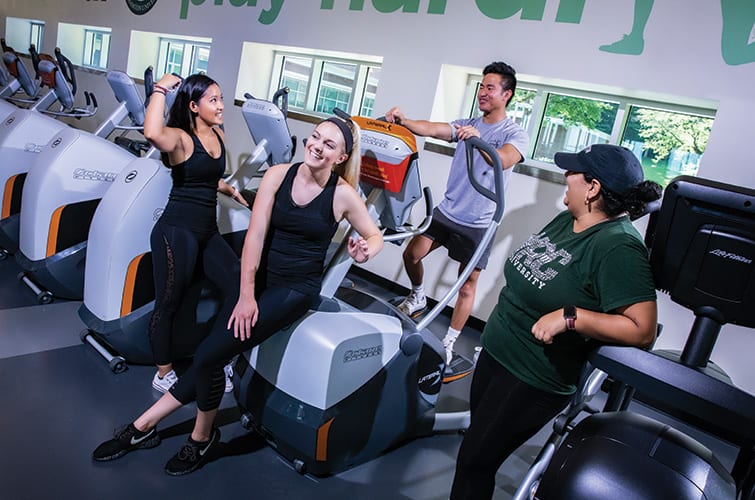
Plus, the internships have even impacted career choice. Binghamton doesn’t have an academic program geared toward recreation, or fitness and wellness. However, Cowden said she’s seen it time and again that a student comes in, starts teaching group fitness or personal training clients, and falls in love with recreation. They then end up going to grad school for something related to those positions. “That’s sort of a running joke about how we turned another one or converted another to the recreation field,” said Cowden.
In fact, Dowd will often bring back Binghamton alumni who have gone to pursue their fitness passions to speak to students currently in the internship programs. “It’s a good way for our students to learn how group fitness can be part of their lives after college,” said Dowd. “Students are able to visualize their future in the fitness industry, which may have not been something they previously considered. Our students are encouraged to see people who were just like them now successful and happy in their professional life.”
Across Campus Collaborations at Binghamton University
Beyond the walls of the rec center, Campus Rec is the driving force for the university’s Healthy Campus Initiative, B-Healthy: Choose Well, Be Well. It started in 2012 as part of the university president’s strategic planning process. Over the last eight years, Cowden said a significant amount of work has been done. In fact, 2021 wrapped up on the first three-year strategic plan. This consisted of five priorities, 20 objectives and 57 action items.
As a result, Cowden said the collaboration across campus through creative approaches has brought much of that change. For example, B-Healthy brought about the creation of the Health and Wellness Incentive Reimbursement Pilot Program. It allows benefit-eligible faculty and staff a 50% reimbursement of their fitness membership fee after completing a set number of exercise sessions.
Another collaboration has led to the Fitness and Wellness program partnering with the Counseling Center to offer Exercise is Medicine on campus. And there are also interventional internships. Cowden described these internships as experiential placements for students. They work with various academic programs on campus to get students into internships that might be run by another program or department. For example, the Master of Social Work program interns interfaced with students in quarantine and isolation housing due to COVID-19.
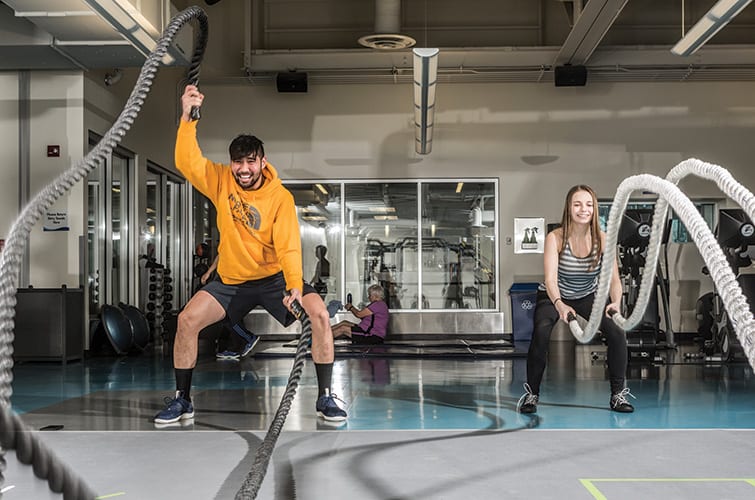
For that reason, Cowden explained it shows how campus recreation overall can play a significant role in a student’s success.
However, Campus Rec’s part is to listen intently and deeply to students, colleagues and the campus as a whole. Cowden shared it’s important other professionals don’t get discouraged. They must work to carefully listen to figure out how to serve their respective university’s needs.
So, the Binghamton team will continue to press into its spirit of competitiveness, resilience, humor and values. Cowden said no one in the industry knows what the full picture will be a year from now. But they can decide, like Binghamton, to press forward and go the extra mile into the unknown.
“That’s going to cause us all to have to strategically think about what our goals are and what our campus-wide goals are and how we can work together to keep pushing that needle forward,” said Cowden.
Images by Jonathan Cohen



